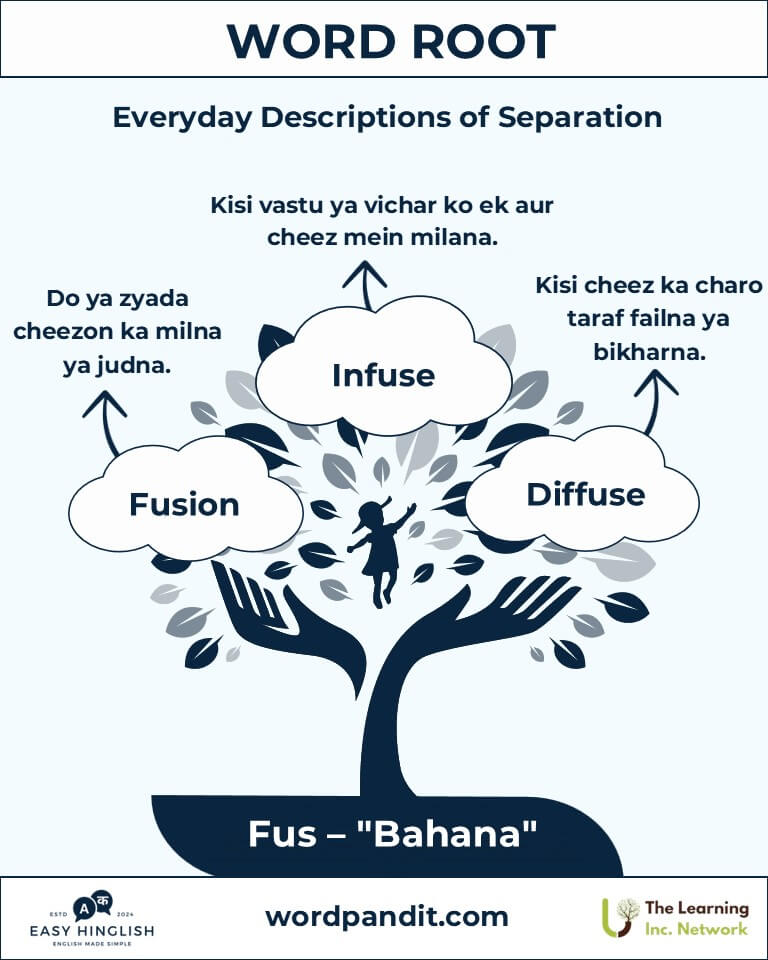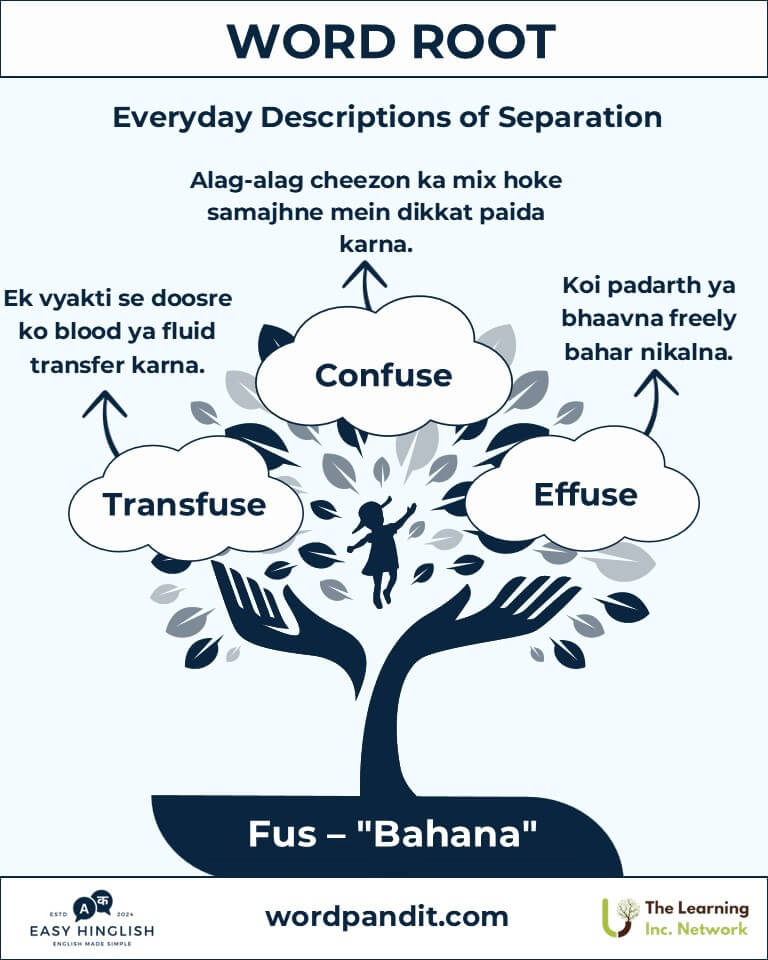Fus: The Root of Fusion and Connection Across Disciplines
(Fus: Fusion aur Connection ka Mool - फ़्यूज़न और कनेक्शन का मूल)
Discover the richness of the word root "Fus," stemming from the Latin fundere, meaning "to pour" or "to melt" (बहाना या पिघलाना). Words like "fusion" (मिलन) aur "infuse" (भरना) highlight its essence of joining, blending, and flowing together. Iska use science, art, aur daily language mein hota hai, symbolizing transformation and connection.

Table of Contents
- Introduction: The Flowing Essence of Fus
- Etymology and Historical Journey
- Mnemonic: Unlocking the Power of Fus
- Common Fus-Related Terms
- Fus Through Time
- Fus in Specialized Fields
- Illustrative Story: Fus in Action
- Cultural Significance of the Fus Root
- The Fus Family Tree
- FAQs About the Fus Word Root
- Test Your Knowledge: Fus Mastery Quiz
- Conclusion: The Living Legacy of Fus
Introduction: The Flowing Essence of Fus
(Fus ka Mool Arth)
Sochiye molten metal jo ek sculpture ke liye mold mein daala ja raha hai—yeh Fus ka power dikhata hai. Latin root fundere se nikla hua "Fus" merging aur transformation ko represent karta hai. Yeh root science (जैसे fusion energy), art (जैसे fusion music), aur daily expressions mein apna place banata hai.

Etymology and Historical Journey
(Fus ki Utpatti aur Itihaas)
- "Fus" ka origin Latin word fundere se hai, jiska matlab hai "to pour" ya "to melt" (बहाना या पिघलाना).
- Roman Era: Metallurgy aur sculpture mein iska use hota tha.
- Modern Usage: English mein "Fus" ka use fusion aur transformation ke concepts ke liye hone laga.
Mnemonic: Unlocking the Power of Fus
(Mnemonic ke Zariye Fus ko Yaad Rakhein)
Imagine ek fountain jo continuously pani pour kar raha hai—yeh flow aur combination ka symbol hai.
Mnemonic Device: "Fus flows into fusion, diffusion, and infusion—sab kuch ek saath milta hai."
Common Fus-Related Terms
(Fus Words aur Unka Arth)
- Fusion (फ्यूज़न): Alag-alag entities ko ek saath merge karna.
- Infuse (इनफ्यूज़): Kisi cheez mein qualities dalna ya instill karna.
- Diffuse (डिफ्यूज़): Scatter karna ya spread out karna.
- Effuse (एफ़्फ्यूज़): Bahar nikalna ya emit karna.
- Transfuse (ट्रांसफ्यूज़): Kisi cheez ko transfer karna, mostly medical context mein.
Fus Through Time
- Profuse (प्रोफ्यूज़): Lavish abundance dikhana.
- Confusion (कन्फ्यूज़न): Mixing ya disorder ko denote karta hai.
Fus in Specialized Fields
- Physics aur Chemistry: Nuclear Fusion: Atomic nuclei ko combine karke energy release karna.
- Medicine: Transfusion: Blood ya fluids transfer karna.
- Art aur Music: Fusion Genres: Different traditions ke styles ko combine karna.
- Environmental Science: Diffusion: Substances ka air ya water mein naturally spread hona.
Illustrative Story: Fus in Action
Dr. Elena Russo ek researcher thi jo fusion energy pe kaam kar rahi thi. Apne hometown ke music festival se inspired hoke, unhone team mein interdisciplinary insights ko infuse karke breakthroughs accelerate kiye. Yeh story Fus ke transformative power ko highlight karti hai.
Cultural Significance of the Fus Root
Ancient metallurgy practices se lekar modern fusion cuisines tak, Fus unity aur transformation ka ek powerful symbol hai. Iska influence har field mein evident hai, science, art, aur philosophy tak.

The Fus Family Tree
- Fund- (Base, pour): Example: Foundation, Refund.
- Found- (Establish): Example: Founder, Confound.
- Fluid- (Flow): Example: Influence (Flow ke through ideas ko shape karna).

FAQs About the "Fus" Word Root
Q1: What does "Fus" mean?
A: "Fus" comes from the Latin word "fundere," meaning "to pour" (बहाना) or "to melt" (पिघलाना). It represents blending and transformation, as seen in words like "fusion" and "infusion."
Q2: How is "Diffuse" connected to "Fus"?
A: The word "Diffuse" comes from dis- (apart - अलग) and fundere (to pour - बहाना), meaning "to pour out." Today, it refers to spreading or scattering, such as light diffusion or the spread of ideas.
Q3: What is the difference between Fusion and Fission?
- Fusion: When two or more elements combine to form one, such as in nuclear fusion where hydrogen atoms merge to form helium.
- Fission: When an entity splits into smaller parts, such as in nuclear fission where atomic nuclei break apart.
Q4: Is "Infusion" only used for liquids?
A: No, "infusion" can also be used for non-liquid concepts. For example, a leader can infuse enthusiasm into a team, or new ideas can be infused into a discussion.
Q5: What does "Effusion" mean in medical and non-medical contexts?
- Medical: Effusion refers to fluid leakage, such as pleural effusion (fluid buildup around the lungs).
- Non-medical: It means an outpouring of emotions or words, such as an effusion of gratitude.
Q6: How is "Confusion" related to "Fus"?
A: "Confusion" comes from con- (together) and fundere (to pour). Originally, it meant "to mix together," but now it refers to disorder or misunderstanding.
Q7: What are real-world examples of Fusion?
- Culinary Arts: Fusion cuisine blends flavors from different cultures.
- Energy: Fusion power is being researched for clean and sustainable energy.
- Art and Music: Jazz fusion combines multiple musical styles.
Q8: Why is "Transfuse" important in medicine?
A: "Transfuse" means to transfer fluids (such as blood) from one body to another. Blood transfusions are lifesaving in emergency care and surgeries.
Q9: What does "Profuse" mean, and how is it connected to "Fus"?
A: "Profuse" means abundant or lavish (भरपूर या बहुतायत). It comes from pro- (forth) and fundere (to pour), meaning "flowing freely," as in "profuse apologies" or "profuse sweating."
Q10: How is "Fus" related to science?
- Physics: Fusion (the combination of atomic nuclei).
- Chemistry: Infusion (steeping substances, like tea).
- Medicine: Effusion (fluid leakage) and transfusion (fluid transfer).
Quiz: Test Your Knowledge of the "Fus" Root
1. What does the root "Fus" mean?
2. Which process combines atomic nuclei?
3. What is the primary meaning of "Transfuse"?
4. What does "Diffusion" describe?
5. What does "Fusion" mean in the arts?
Conclusion: The Living Legacy of "Fus"
The "Fus" root reflects humanity's ability to unite and transform. Whether in physics, art, or everyday language, "Fus" shows us how different elements can merge to create something new and impactful.








